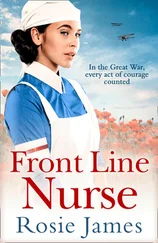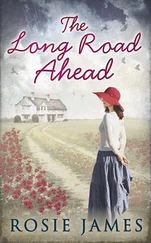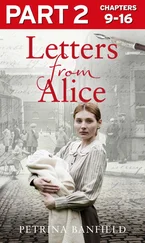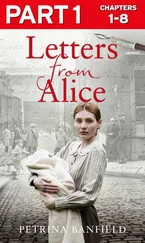‘Humph’, Lizzie snorted. ‘Anyway, you and your Ma were only asked to live in because of your Pa being killed. That’s what Cook said.’ A thin smile played on the pale lips. ‘A stroke of luck that he was, then, eh?’
Alice straightened up, tossing her thick, dark plait over her shoulder angrily, her green eyes flashing with savage indignation. Although her father had never been a constant member of the family – well, how could he be, with his job – Alice had always loved him dearly and the thought that anyone should think it was a good thing he was dead was obnoxious. She moved purposefully towards Lizzie – who involuntarily took a step back, realizing she’d gone too far.
‘Don’t you dare say that,’ Alice said quietly. ‘My papa was a valued member of the crew – the captain told my mother. And they were sorry that he’d died. Everyone was sorry.’ Alice bit her lip hard. She was not going to shed even one tear in front of the maid, even though the lump in her throat was nearly killing her. ‘What you just said Lizzie was…despicable!’
‘Ho! Hoity-toity! Des…des…picabubble…am I? What sort of word is that?’ Lizzie retorted.
Well, if you read some books you might know what the word meant, Alice thought.
Reading had been Ada, Alice’s mother’s solace during her lonely hours, and she’d instilled the love of literature in her daughter. Alice could read fluently by the time she was six, and she was seldom away from school.
‘Oh, just go away, Lizzie, I’ve got things to do,’ she said airily, turning away.
Alone at last, Alice sat on the edge of the big double bed for a moment, her eyes welling up with the tears she’d managed to hold back. Although her father had only ever been back for one week at a time, and then gone again for six, Alice always looked forward to his home-coming, for them to be together again, just the three of them, in the two-bed terrace house they rented in Hotwells. And Alice’s father would always bring them little presents from wherever he’d been, and tell them how much he’d missed them while he’d been away.
And Ada never once complained about the fact that her jovial husband spent much of his leave down at the pub with his friends, often coming home so drunk she had to put him to bed to sleep it off. And when, one day, Alice had commented on this fact to her mother, she had been gently rebuked.
‘It’s the way with some people, with some men, Alice,’ she’d said. ‘Your Pa needs to have one or two drinks when he’s ashore. God alone knows how he – how his ship – survived the Great War. He…he deserves to be able to relax when he’s ashore.’ But Ada herself never touched a drop of anything, and refused to have alcohol in the house.
‘It’s the devil’s medicine, Alice,’ she said once. ‘Remember that.’
Ada was a spare- framed woman, prematurely grey, with shrewd eyes and a nature to match. She’d always known that the man she loved was not the sort to be relied upon, so three years ago she’d applied for the post of nanny to the five children of Professor Edward Carmichael, the eminent Bristol surgeon. And she couldn’t have known that the day she was ushered into the vast, high-ceilinged morning room at the big house in Clifton for her interview with Helena Carmichael, it was to change her and her daughter’s life for ever.
Mrs. Carmichael was a classically elegant woman with aristocratic, high cheek bones, widely spaced blue eyes and a perfect, sculptured mouth. Her blonde hair was swept up into a large shining knot on top of her head, and her pale, unblemished hands were calm and unhurried as her fingers turned the pages she was holding. Ada, slightly awe-struck to be in the presence of such a person, instinctively buried her own work-worn hands behind her bag, trying not to feel a lesser mortal. But Helena Carmichael’s friendly manner quickly laid any fears to rest, and after almost an hour’s conversation together, she’d said –
‘Well, I was very impressed with your letter of application, Mrs.Watts, and together with the glowing reference given to me by the vicar of St. Stephen’s church, I am quite certain that you are going to suit us very well…very well indeed.’ She’d glanced again at the papers in front of her. ‘So… I have great pleasure in offering you the position.’
‘Thank you, Madam,’ Ada had said quietly.
‘But of course – before you agree, I am sure you would like to meet the children? They are upstairs in the nursery.’
Ada had followed her future employer up the dark-oak winding staircase to the first floor, the whiff of polish, of orderliness, of affluence, making her senses swim briefly. She had never been anywhere like it before, but she had known such places existed because she had read about them often enough in classical literature. She wondered briefly if Mrs. Carmichael and her kind knew anything at all about how other people lived, just a mile or so away from here…the poverty, the squalor. Ada’s house was not squalid, and they were not that poor because her husband was employed. But the seven children living next door had no father that anyone was aware of, and often no shoes on their feet, either. Ada regularly took them in a basket of food when she knew things were really bad, and when the last baby had been born she’d helped another local woman to deliver the child, and for some months afterwards had done their pathetic washing.
Upstairs on the first floor, Ada had been ushered into the massive nursery where the children spent most of their day, overseen by the present nanny who was soon to depart to have her own child.
There were two sets of twins – the boys, David and John who were five, and the girls, Rose and Margaret, who were just two. None was identical, but they all shared the same tousled, curly hair, the same dark eyes. They were alert and interested as they gazed up at Ada.
‘Well, here they all are, Mrs. Watts,’ Helena Carmichael had said. ‘A tutor comes in each morning for two hours to teach the boys their lessons, and if at times it becomes necessary, I can always get you extra help with the girls. And of course, you have yet to meet Samuel, our eldest, who is ten, well almost eleven, and at boarding school. But he’ll soon be home for the holidays.’ She had glanced at Ada quickly. ‘And your own daughter…Alice….she is seven, I think you said?’
‘Yes,’ Ada had replied. Then, summoning all her courage she’d said deferentially – ‘Could I…may I have your approval that Alice comes up here at the end of each school day at 3 o’clock? I…I would not like to think of her home alone until I get back much later in the evening.’
‘Of course you have my approval!’ Mrs. Carmichael had replied. ‘And Alice must have her tea with you and the children. Cook bakes cakes most afternoons.’
‘Thank you, Madam,’ Ada said.
‘But…’ Helena had frowned briefly. ‘It’s surely going to be a very long walk for Alice all the way up here to Clifton, isn’t it?’
‘Oh, Alice is more than capable of walking the distance,’ Ada had replied at once. ‘She is strong, and very capable…a very sensible child. She will be happy to give me a hand with the children sometimes…I know she would love to read them their bedtime stories.’
Helena had nodded happily. ‘And you are quite sure that the hours will fit in with your own domestic requirements?’ she’d enquired. Ada was to come in by 8 o’clock each day to give the children their breakfasts, and to stay until 7 o’clock in the evening, after their baths. With Sundays and one afternoon off each week.
‘Quite sure, thank you, Madam,’ Ada had replied.
‘Then that’s all settled! We shall look forward to you being part of our staff…part of the family, Mrs. Watts,’ Helena had said.
Читать дальше












